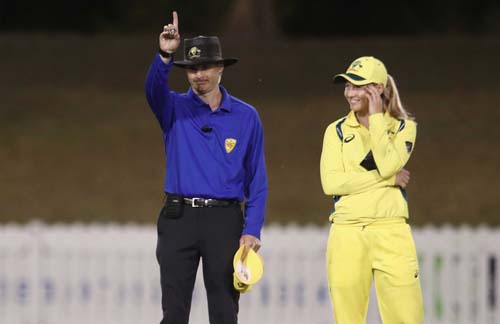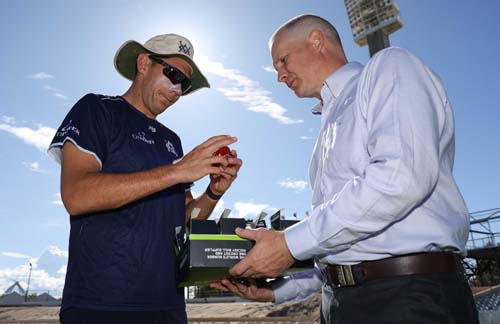
Broken jaw to global stage: Gillespie’s path to elite umpire
Jack Paynter
Phil Gillespie’s journey to the pinnacle of Australian umpiring began with a broken jaw in a suburban cricket match in Melbourne’s outer east.
He was just two games back from a knee reconstruction – which followed a snapped Achilles a couple of seasons earlier – and it was the final straw for the then captain-coach of Rowville in the Ferntree Gully & District Cricket Association to call time on his playing career.
His initial foray into umpiring came because he intended to progress into coaching in his post-playing days.
But luckily for him, and Australian cricket, Victorian umpiring legend Bob Parry was teaching winter classes about the Laws of Cricket and convinced Gillespie to take up officiating instead.
“I’m forever grateful to him for talking me into it,” Gillespie told cricket.com.au after his appointment as one of four members of the nation’s international umpiring panel for 2022-23 alongside Paul Wilson, Donovan Koch and Sam Nogajski.
It follows an outstanding season for the former wicketkeeper-batter, who made his women’s Test debut during Australia’s clash with India in September as well as receiving the 2021-22 Cricket Australia Umpire Award for his exceptional contributions at both international and domestic level.
He also earned on-field appointments in both the KFC BBL and Marsh One-Day Cup finals last summer and was the third umpire during the Sheffield Shield final.
Nathan Johnstone and Ben Treloar have also been selected to the National Umpire Panel for the first time for next season, while Simon Lightbody returns following a previous stint.
For Gillespie, his international appointment is a far cry from his goal when he first turned to umpiring in 2009-10, which was to officiate a Premier Cricket match.
But much like a player who reaches the top level, he started in fourth grade Premier Cricket and gradually worked his way up through the XIs until he earned a spot at domestic level.

Now, as a member of the International Panel, Gillespie is eligible to officiate men’s Tests, one-day and T20 internationals and as he continues to progress through the ranks, start travelling overseas for matches like ‘Blocker’ Wilson has done in recent times.
“It’s a privilege to be considered for it, especially with such a strong (international) panel,” Gillespie said.
“You’ve got guys like Paul Wilson on that panel who have been performing on the world stage really strongly for quite a number of years and to be considered for a panel that he’s on, it’s a great privilege.
“To get that opportunity to be able to umpire with those guys on the international stage is something I’m really looking forward to, along with Rod Tucker and Paul Reiffel; they’re legends of umpiring from our point of view, so it’s great to be part of their team now.
“Last year, Rod Tucker umpired a few Shield games … I got a game with him which was really great to learn from him and Bruce Oxenford has come back to our panel, so the opportunity to stand with them is fantastic.”
During his women’s international debut last season there was no DRS, which is one of the major differences Gillespie will face when he steps onto the global stage next summer.
But he said standing with the likes of Tucker, Oxenford and Wilson had already provided him with valuable insights around positive body language when a decision is overturned.
“Umpiring with DRS is what we all want; I think it’s a lot easier for an umpire when there’s DRS in the game because you can move on from the error quickly when it’s overturned and resolved,” Gillespie said.
“(That) women’s Test match, it was four days of significant scrutiny, which is great learning and a great opportunity for us to be put under that scrutiny, they’re opportunities that we really want.”
When he’s not at the centre of Australia’s biggest domestic cricket moments, Gillespie is juggling his work commitments as a serving Victoria Police officer, which he plans to continue following his appointment to International Panel.
“I’d like keep doing both, I still enjoy doing both,” he said. “I think it keeps me a bit grounded to have an interest outside of umpiring or an interest outside of policing.”
Asked what his message would be for someone considering a career in umpiring, Gillespie said it’s the “best seat in the house” for someone who wants to stay involved in the game once they finish playing.
Like the time he witnessed Kiwi Colin de Grandhomme smash 217 off just 124 balls while on an umpire exchange at New Zealand’s club championships in 2011.
“It was the best hitting I’ve ever seen,” Gillespie said. “He was hitting balls into a hospital car park, they had to get someone to stay there because he just kept hitting them in there.
“Very few people are good enough to be able to play at (the top) level, the stats certainly show that and another opportunity for people is umpiring.
“We get to see some unbelievable cricketers, male and female. I started in fourth grade and got to see some young kids coming through like – and I know he’s just retired – Seb Gotch and Sam Harper, they were running around in fourth grade when I started, and I still umpire them today.”
Cricket Australia’s Head of Cricket Operations and Scheduling, Peter Roach, also congratulated Darren Close and Tony Wilds for their achievements in umpiring the highest level of cricket in Australia after they were not included on the panel for next season.
